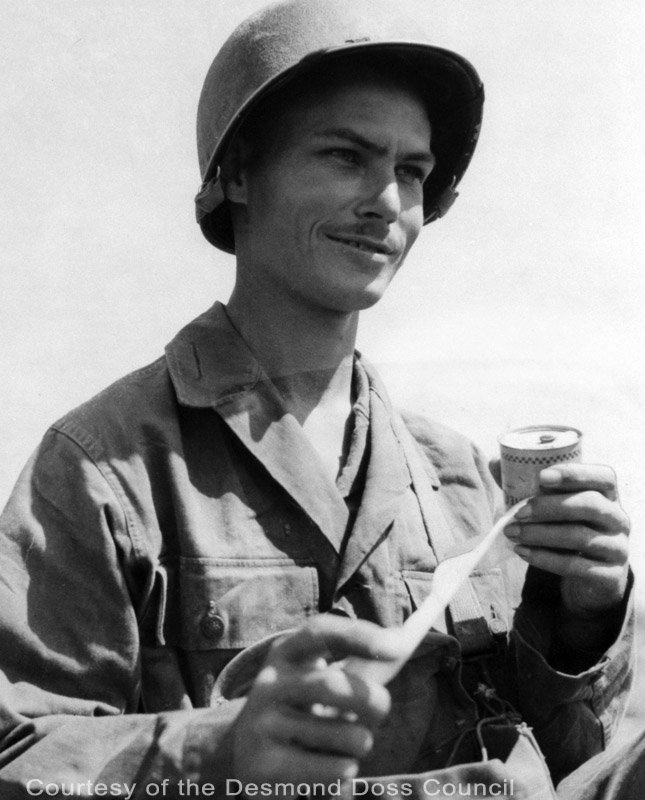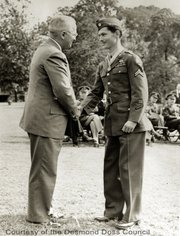"Help me, Lord, get one more," Army Pfc. Desmond Doss uttered the prayer again and again as the young medic saved fellow soldiers wounded and trapped at the top of the Maeda Escarpment on Okinawa, Japan.
Doss' actions on Okinawa and during combat on the Pacific islands of Guam and Leyte during World War II earned him the Medal of Honor for bravery and courage under fire.
Hacksaw Ridge
Producer: Bill Mechanic
Director: Mel Gibson
Writers: Robert Schenkkan (script), Randal Wallace (screenplay), Andrew Knight (screenplay)
Starring: Andrew Garfield (Desmond T. Doss), Vince Vaughn (Sergeant Howell), Sam Worthington (Captain Glover),Teresa Palmer (Dorothy Schutte), Hugo Weaving (Tom Doss)
"While others were taking life, he was busy saving life," reads the book Hero of Hacksaw Ridge by Booton Herndon, an authorized story of Doss. "When the cry 'medic' rang out on the battlefield, he never considered his own safety. He repeatedly ran into the heat of battle to treat a fallen comrade and carry him back to safety. All this, while enemy bullets whizzed past and mortar shells exploded around him."
But what makes this story unusual is Doss' status in the Army was that of a "conscientious objector," and he was the first with this designation to earn the nation's highest honor. Throughout his service, Doss stood firm in the teachings of his Seventh-day Adventist faith.
Doss' story is told in the movie Hacksaw Ridge, currently playing in area theaters.
The Springdale Adventist Fellowship is offering Herndon's book about Doss and the church free to anyone interested, and pastor Juan Fresse is available to answer questions about the movie and the faith.
'INCH BY BLOODY INCH'
"In May 1945, as German troops were surrendering on the other side of the world, Japanese troops were fiercely defending, to their last man, the only remaining barrier (Okinawa and the Maeda Escarpment) to an Allied invasion of their homeland," reads the website of the Desmond Doss Council, established -- at the request of Doss -- under the direction of the Georgia-Cumberland Conference Association of the Seventh-day Adventist church. The council's mission is to "preserve, protect and manage the life story of Desmond T. Doss."
The men in Doss' division again and again climbed the escarpment, an imposing rock face the soldiers called "Hacksaw Ridge." The company had secured the top of the cliff, but suddenly enemy forces rushed them in a vicious counterattack. "Officers ordered an immediate retreat," the website reads. "Soldiers rushed to climb back down the steep cliff -- all the soldiers except one."
Less than one third of the men made it back down, the website records. Many remained atop the escarpment wounded and left for dead.
"One lone soldier disobeyed orders and charged back into the firefight to rescue as many of his men as he could, before he either collapsed or died trying," the website reads. "His iron determination and unflagging courage resulted in at least 75 lives saved that day, May 5, 1945, his Sabbath."
The movie shows Doss lowering one man at a time via rope from the escarpment -- using a bowline his commanders criticized in basic training. "Someone's up there, dragging wounded from the top, and he's been doing it all night," says a soldier reporting to his commander in the movie.
Eventually, the Americans took Hacksaw Ridge. "Okinawa was captured inch by bloody inch," the Doss website reads.
NO COMPROMISE
Doss was born in Lynchburg, Virginia, son of William Thomas Doss, a carpenter, and Bertha E. (Oliver) Doss, the website introduces.
"Desmond Doss enlisted in April 1942, but refused to kill or carry a weapon into combat because of his personal beliefs as a Seventh-day Adventist," the website reads. "He consequently became a medic, and while serving in the Pacific Theater of World War II he helped his country by saving the lives of his comrades, at the same time adhering to his religious convictions."
Doss refused to compromise based on strong belief in the Bible, according to the Hero of Hacksaw Ridge, which also highlights some tenets of the Adventist faith. "The Holy Scriptures, Old and New Testaments, are the written Word of God, given by divine inspiration," the book reads. "... The Holy Scriptures are the supreme, authoritative and the infallible revelation of his will. They are the standard of character, the test of experience, the definitive revealer of doctrines, and the trustworthy record of God's acts in history."
Two of Doss' convictions earned him ridicule from his fellow soldiers and commanding officers.
Doss' adherence to the Sixth Commandment -- "Thou shalt not kill" -- meant he would not touch a gun, quite a challenge when he was assigned to a rifle company. When Doss enlisted, he was told he could serve as a medic and not have to carry a gun. But the Army had other plans.
Doss also faced harassment for his keeping of the Sabbath, which runs from sundown Friday to sundown Saturday in the Seventh-day Adventist faith. Doss' refusal to work during the Sabbath led his fellow soldiers to think he was shirking his responsibilities.
But once on the battlefield, Doss earned the admiration of his combat brothers.
"Things began turning around when the men discovered that this quiet, unassuming medic had a way to heal the blisters on their march-weary feet," the Doss website reads. "And if someone fainted from heat stroke, this medic was at his side, offering his own canteen."
In the movie, Doss' character is seen calmly telling soldiers to "keep breathing." As he lifted them to pull them out, he'd confidently say, "Let's go. It's you and me. C'mon."
"I went to my battalion commander, Col. Gerald Cooney, and I suggested that, in my opinion, Doss should be transferred," recalls Cpt. Jack Glover in The Conscientious Objector, a documentary made by the Doss Council.
But after after serving alongside Doss, Glover's opinion of him changed. "He was one of the bravest persons alive, and then to have him end up saving my life was the irony of the whole thing," Glover said.
"Desmond never held a grudge," the website reads. "With kindness and gentle courtesy, he treated those who had mistreated him. He lived the golden rule, '... Do to others what you would have them do to you ...'"
CONSCIENTIOUS COOPERATOR
"When the Japanese bombed Pearl Harbor, Doss was working at a shipyard in Newport News, a position which made him eligible for deferment," reads the website. "Though taking it might have been an easier means of staying true to his convictions, Doss felt a moral obligation to serve, especially because the fight was not just for freedom but for religious liberty. He figured that as a medic, he could, as he put it, 'be like Christ: saving life instead of taking life.' He also believed serving as a medic would prevent him from having to break the Fourth Commandment (to honor the Sabbath, observed by Seventh-Day Adventists on Saturdays) because, as he argued, 'Christ healed on the Sabbath.'"
Doss never liked the term "conscientious objector." Instead, he preferred "conscientious cooperator."
"I really appreciated that he wanted to serve," Pastor Fresse said. "He could've shown them he knew how to use a rifle -- he was a country boy. But he did not give up on his principles."
"Adventists love our country very much," said Ross Hinshaw, a member of the Springdale Fellowship, noting that his faith is often confused with another that does not support soldiers.
"A lot of us find ways to serve," he continued. "We salute our flag. We love our country. We honor our veterans."
Hinshaw added that two current members of the military will be returning from service soon, "and we'll give them a hero's welcome."
The congregation will recognize its veterans today -- supporting even those who did carry guns in combat, Fresse said.
Fresse continued, saying he hopes people take from the movie the message to "trust in our beliefs, trust in something more than ourselves."
"In the current political climate, there's a lot of division, a lack of trust. If you just depend on people, and people do people things, you can feel frustrated and let down. We need to learn to look for answers outside of ourselves, to ask God to help us on our own journey as individuals."
"I just hope people are impacted by the story and evaluate their own contributions to our society," he concluded.
PRIZED POSSESSION
Wounds suffered at the Maeda Escarpment and tuberculosis developed during his service left Doss disabled for the rest of his life. He died in 2006.
The website records the incident: "Several days later, during an unsuccessful night raid, Desmond was severely wounded. Hiding in a shell hole with two riflemen, a Japanese grenade landed at his feet. The explosion sent him flying. The shrapnel tore into his leg and up to his hip. He treated his own wounds as best he could. While attempting to reach safety, he was hit by a sniper's bullet that shattered his arm. His brave actions as a combat medic were done. But not before insisting that his litter-bearers take another man first before rescuing him. Wounded, in pain, and losing blood, he still put others ahead of his own safety. He would choose to die so another could live. After all, that's what he read in his Bible. Such was the character demonstrated by Jesus Christ."
"When he was shot in his arm, he used a rifle to make a splint, and continued to crawl around, helping the wounded," Hinshaw said. "When he was finally on a gurney, he crawled off the gurney to help another wounded man. Mel Gibson [movie director] left that scene out [of the movie]. He thought that was too fantastic to put in the movie, that people wouldn't believe it."
"President Harry S. Truman warmly shook the hand of Cpl. Desmond Thomas Doss, and then held it the entire time his [Medal of Honor] citation was read aloud to those gathered outside the White House on October 12, 1945," reads the Doss website. "'I'm proud of you,' Truman said. 'You really deserve this. I consider this a greater honor than being president.'"
"Of the 16 million men in uniform during World War II, only 431 received the Congressional Medal of Honor," the website continues. "One of these was placed around the neck of a young Seventh-day Adventist, who during combat had not killed a single enemy soldier. In fact, he refused to carry a gun. His only weapons were his Bible and his faith in God."
His wife gave him a pocket edition of the Bible before he left for the Guam, and he carried it everywhere.
"War or no war, Desmond Doss was a firm believer in reading his Bible," the Doss website reads. "When he was eventually wounded and taken by ambulance to an Army hospital ship, he discovered that he had lost his most valued possession. Word was passed to his friends, who went back to the battlefield and eventually found the Bible and sent it to him."
NAN Religion on 11/12/2016


